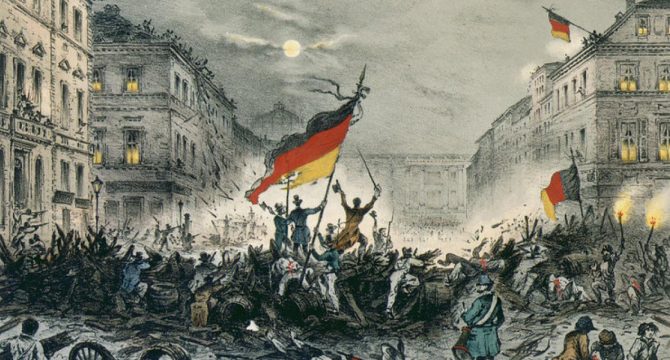1848 skakades flera europeiska länder av revolutioner, en händelserik period som bland annat getts namnet folkens vår. Det var också en intensiv tid för två blivande marxist-leninistiska husgudar vid namn Marx och Engels. De båda rapporterade, analyserade och försökte påverka händelserna i tidskriften Neue Rheinische Zeitung. För idéhistoriker är det givande läsning, bland annat då man här kan följa trådar i deras analys som senare är mer diffusa. Inte minst gäller det dialektiken mellan folk och klass, även om vi också tidigt finner inslag som den grälsjuka inställningen till Proudhon och intresset för politisk ekonomi.
I det första numret hänvisar Engels direkt till folket, ”the German people won its sovereign status by fighting in the streets of almost all towns in the country.. The bold and public proclamation of the sovereignty of the German people should have been the first act of the National Assembly”. I det sista varnar redaktionen arbetarna för att ”the bourgeoisie sends the workers into the fire and betrays them afterwards in the most infamous way”. Överhuvudtaget spelar folket, das Volk, en central roll. Engels framstår inte sällan som en radikal demokrat med nationalistiska förtecken, bland annat när han framför att folkets suveränitet ska göras till kärnan i den nya författningen. Men även Marx tar upp behovet av ett beväpnat folk, i ordalag som för tankarna till samtida amerikansk milisrörelse. I en text om motståndarnas planer skriver han att ”det reaktionära Berlin” ”strives to disarm all civil guards, especially on the Rhine, as soon as possible, to destroy gradually the whole arming of the people now developing, and to deliver us defenselessly into the hands of an army consisting mostly of foreign elements either easily assembled or already prepared”. Av visst intresse här är även insikten att en antifolklig elit kan använda ”främmande element” mot folket (jämför Weber). Både Marx och Engels menade för övrigt att ”intimidation by the unarmed people or intimidation by an armed soldiery — that is the choice before the Assembly”. Identitet mellan folk och militär framstår kort sagt som lika avgörande som folkets beväpning.
I flera texter utvecklar Engels resonemanget kring elit och främlingar. Detta gäller inte minst den folkutbytespolitik som fördes i det preussiskt kontrollerade Polen. Han frågar sig i sammanhanget ”how would we look upon people who bought our land for next to nothing while competition was excluded, and who did it moreover with the support of the government?” och konstaterar att ”in Poznan those colonists were sent methodically, with unabated persistence, to the demesnes, the forests and the divided estates of the Polish nobility in order to oust the native Poles and their language from their own country and to set up a truly Prussian province”. Noteras kan i sammanhanget Engels inte alldeles politiskt korrekta resonemang och tvetydigheter kring förhållandet mellan preussiska och lokala judiska intressen, med ordval som ”profit-hungry”. Av generellt intresse här är relationen mellan lokal minoritet och främmande överhet, något man kanske som en liten referens till 1970-talets vänster kan benämna kompradorminoriteter. Grundperspektivet är i varje fall att ”all hitherto existing rulers and their diplomats have employed their skill and efforts to set one nation against another and use one nation to suppress another, and in this manner to perpetuate absolute rule”. Ett tema som återkommer i de bådas senare texter, för att citera en åldrad Engels att ”ett verkligt internationellt samarbete mellan de europeiska folken är möjligt endast då, när vart och ett av dessa folk är helt och håller herre i sitt eget hus”.
Kopplat till detta finns, återigen främst hos Engels, ett intresse för konflikten mellan ett frihetligt Väst och till detta knutna klasser och nationer på ena sidan och ett despotiskt Öst på den andra. Men även hos Marx finner vi detta tema, bland annat skriver han att ”the defeat of the working class in France and the victory of the French bourgeoisie was at the same time a victory of East over West, the defeat of civilization by barbarism. The suppression of the Romanians by the Russians and their tools, the Turks, began in Wallachia; Croats, pandours, Czechs, serezhans and similar rabble throttled German liberty in Vienna, and the Tsar is now omnipresent in Europe. The overthrow of the bourgeoisie in France, the triumph of the French working class, and the liberation of the working class in general is therefore the rallying-cry of European liberation.” Eurocentrismen är här mer än underförstådd. Detsamma gäller skepsis mot ”det perfida Albion”, Marx fortsätter med att angripa ”England, the country that turns whole nations into her proletarians, that spans the whole world with her enormous arms, that has already once defrayed the cost of a European Restoration, the country in which class contradictions have reached their most acute and shameless form.” Den hugade kan uppdatera analysen till 2020-tal, ett annat imperium kan då ha tagit Englands plats i väster.
Intressant är överhuvudtaget distinktionen mellan stat och samhälle, tydlig i synnerhet vad gäller det av författarna illa sedda Preussen. Bland annat skriver Engels att ”not only the Poles but also the other Prussians, and especially we from the Rhine, can tell a tale about the “rigidly regulated” and “strictly enforced” measures of the worthy Prussian bureaucracy, measures which “disturbed” not only the old customs and traditional institutions, but also the entire social life, industrial and agricultural production, commerce, mining, in short all social relations without exception.” Byråkratin och staten framstår här som relativt autonoma aktörer, vilka inte sällan dominerar borgarklassen. Borgarnas ambivalenta relation till arbetare respektive monarki/byråkrati/militär är enligt de båda särskilt stark i Tyskland. Men grundinställningen, stat mot samhälle, uttrycks kärnfullt i stycken som ”developments will not wait for the bills of exchange drawn by the European states on European society to expire”.
Något motsägelsefullt kan mot denna bakgrund Engels betoning av centraliseringens värde, ”stringent revolutionary centralisation”, framstå. Men det handlar här ytterst om geopolitik och överlevnad. Intressant är annars formuleringarna kring skatt och skattestrejk. Marx uppmanar bland annat läsarna att ”starve the enemy and refuse to pay taxes! Nothing is sillier than to supply a traitorous government with the means to fight the nation, and the means of all means is money.” Vän av ordning komer här invända att ”det var då, det var den gamla monarkin, vår tids stat har en helt annan klassbas”. Men frågan är då vad det egentligen handlar om för klassbas och om det inte även idag handlar om en ”traitorous government”.
Oavsett vilket, av betydande intresse är analysen av spelet. Det handlar om spelet mellan folk och överhet, men detta bryts sedan ner i ”trialektiken” mellan arbetare, borgare och överhet, där en del av folket ständigt riskerar att utnyttja arbetarna för att vinna eftergifter från överheten men sedan byter sida. För att komplicera det hela ytterligare för Marx och Engels även in trasproletariatet, ibland med etniska förtecken, i stycken som ”the bourgeoisie is leagued with the lazzaroni against the working class”. Borgarskapets projekt att ”transform the feudal monarchy into a bourgeois monarchy by peaceful means” saboteras samtidigt av att ”the old bureaucracy does not want to be reduced to the status of a servant of a bourgeoisie for whom, until now, it has been a despotic tutor”. Detta kompliceras ytterligare av den etniska faktorn och konflikten mellan Väst och Öst. Sammantaget en komplex bild, men en användbar modell även för att förstå vår egen samtid. Även om de konkreta klasserna och staterna idag delvis är andra än då.
Avslutningsvis noterar vi att Engels förebådade Carl Schmitts insikt att en ordning inte i längden kan bygga på två motsatta principer, ”the results of the revolution were, on the one hand, the arming of the people, the right of association and the sovereignty of the people, won de facto; on the other hand, the retention of the monarchy and the Camphausen-Hansemann Ministry, that is a Government representing the big bourgeoisie. Thus the revolution produced two sets of results, which were bound to diverge. The people was victorious; it had won liberties of a pronounced democratic nature, but direct control passed into the hands of the big bourgeoisie and not into those of the people.” Sammantaget finns det alltså en del av värde i artiklarna från de intensiva revolutionsåren 1848 och 1849, inte minst för den som vill finna verkligt subversiva analyser och citat att vidareutveckla eller slänga i ansiktet på etablerade ”marxister”.











